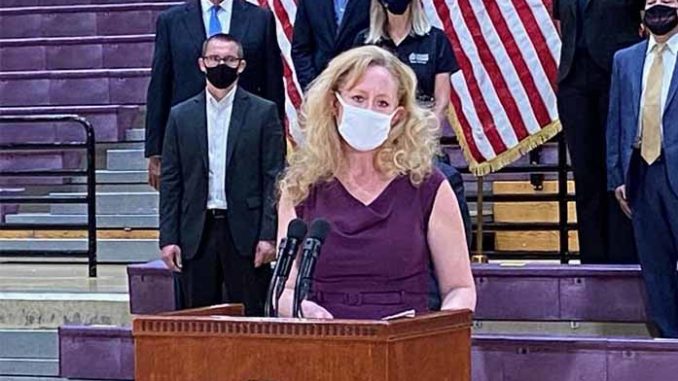
Ronald Reagan once famously said “The most terrifying words in the English language are: I’m from the government and I’m here to help.” After six months as unwitting subjects in an unprecedented experiment designed by our new bureaucratic masters, the Arizona Department of Health Services (ADHS), a.k.a., the Arizona Department of Human Subjects, we need to modify Reagan’s dictum. For the citizens of Arizona, the most terrifying words are: “I’m from the Arizona Department of Health Services and I am here to formulate and dictate your public policy response to the pandemic.”
The grand experiment and the concomitant adoption of our state-run religion of mandatory “social distancing” began on March 11, when Governor Ducey declared a “state of emergency,” which concludes with the following sentence: “This Emergency Declaration will be eligible for termination upon the resolution of the outbreak as determined by the Arizona Department of Health Services.” For the next six months, we have ceded authority over our economy and society to these unelected bureaucrats, who seem to be accountable to no one. All aspects of our lives, including “re-openings,” are subject to their approval, so that their grand social experiment can continue.
The ADHS experiment consists of three unprecedented and deviant “non-pharmaceutical interventions (NPIs).” The first is physical distancing (i.e., the “six-feet rule”), which has been indiscriminately applied to every industry and aspect of our lives. A second NPI is the quarantining of virtually the entire population (e.g. “stay-at-home” orders). Finally, we have the most draconian NPI: shutdowns and “re-openings” of entire industries, based on a totalitarian taxonomy of industries and workers who have been deemed by our governor to be “essential” or “non-essential.” From an economic standpoint, forced shutdowns of industries can only be described as an unprecedented, monumental act of economic masochism, as well as constituting theft of private property (of business owners) and services (e.g., education), and of course, economic, personal, and religious liberty.
It is important to note that the ADHS experiment has been conducted without our “informed consent.” As social scientists, when we conduct an experiment, we are required by law to obtain the informed consent of our human subjects. These protocols were established in the aftermath of several unethical experiments, most notably, the Tuskegee syphilis study and the Stanford prison experiment, which both resulted in irreparable damage to their subjects.
Specifically, when we conduct an experiment, we are required to explain to each subject, in great detail, precisely what we are trying to accomplish in our research project, as well as its duration, cost, and risks. We also have to abide by an ethical code, which says that there should be no psychological or physical harm to the subject. None of these protocols have been followed in the ADHS. In addition, even our legislative representatives have not provided informed consent.
Now that six months has transpired since we ceded authority and control over the state of Arizona to ADHS, it is time take stock and hold our bureaucratic masters accountable. Over the last six months, the ADHS response to the “state of emergency” has led to the greatest forced collective sacrifice in the history of the state. Our governor is fond of saying that this forced collective sacrifice is necessary to advance public health and save lives. Unfortunately, it is becoming increasingly apparent that tactics employed in the ADHS experiment (physical distancing, quarantines, lockdowns, and “re-openings”) are actually harming public health and thus, destroying lives as well.
The time has come for an honest and thorough evaluation of the trade-offs involved in continuing the ongoing experiment. First, we must have complete information on public health outcomes before and after the experiment began. ADHS reports voluminous statistics on the transmission of the virus, yet throughout the pandemic, the agency has failed to report and highlight statistics on such key public health variables as suicides, drug overdoses, child abuse, human trafficking, domestic violence, addiction, mental health, and obesity/weight gain. The economic damage caused by the ADHS experiment has been astronomical, but the public (the unwitting subjects of the ongoing experiment) also needs to know how the experiment is affecting all aspects of public health, not just the spread of COVID-19. It is conceivable that in the long run, more people will die because of mandatory social distancing than have perished due to the virus. At a minimum, as subjects in the experiment, we need to know how much harm the experiment has inflicted on us.
Finally, there is the question of the duration of the experiment. ADHS must outline an exit strategy, so we can end Arizona’s longest “state of emergency.” That is, we need to know when this experiment will end and when we can return to normal. Given that Governor Ducey has chosen to defer to ADHS on matters relating to the state of emergency, our legislative representatives must act swiftly. They must hold ADHS accountable, so we can better a more thorough and complete evaluation of the costs and benefits of the policies that have been implemented based on their advice.
—
Donald S. Siegel, Ph.D., Foundation Professor of Public Policy and Management and Director, School of Public Affairs, Arizona State University (Donald.Siegel.1@asu.edu)
Robert M. Sauer, Ph.D., Professor of Economics, Royal Holloway, University of London (Robert.Sauer@rhul.ac.uk)
